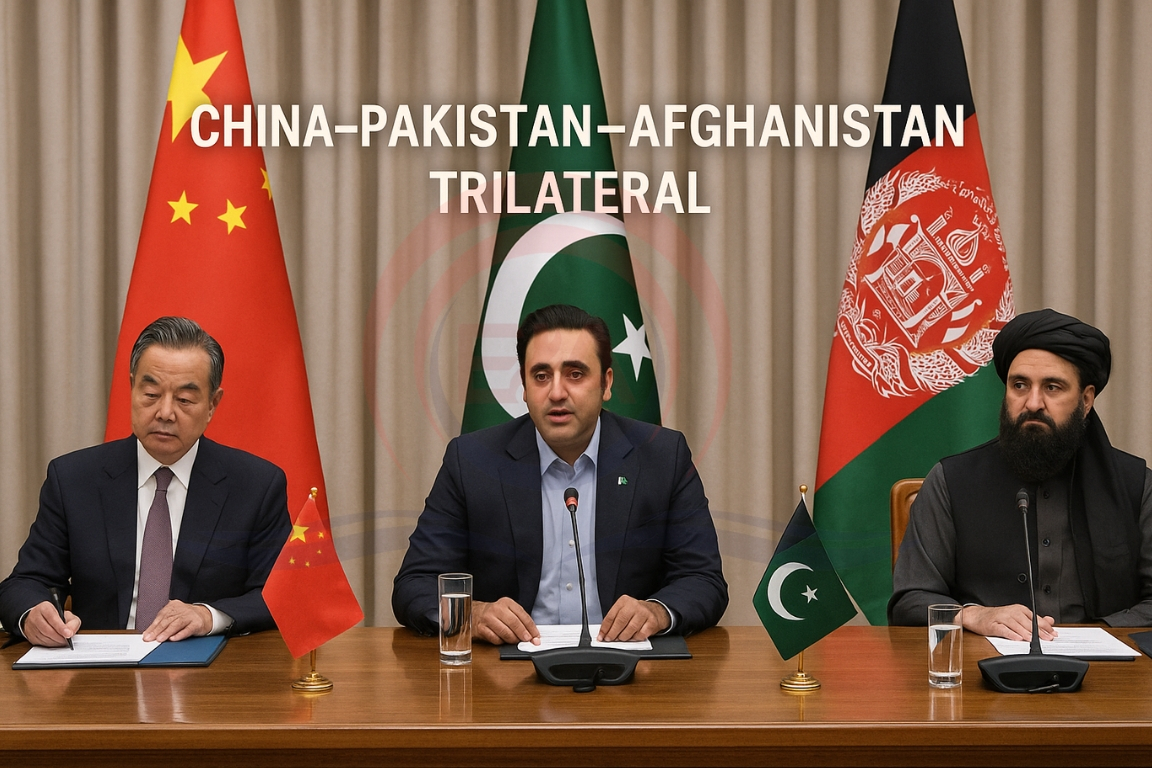The recent trilateral meeting of the foreign ministers of China, Pakistan, and Afghanistan marks a new phase in regional geopolitics. The decision to extend the China–Pakistan Economic Corridor (CPEC) into Afghanistan has implications not only for the three countries but also for India’s strategic and security interests.
Key Objectives of the Trilateral Engagement
- Connectivity and Trade Integration: Expansion of CPEC to link Afghanistan with Central Asian markets; completion of railway lines between Pakistan and Afghanistan.
- Resource Exploration: China to invest in Afghanistan’s mineral sector, including lithium and copper.
- Political and Diplomatic Ties: Taliban’s participation in BRI platforms, giving them visibility despite lack of global recognition.
- Security Cooperation:
- Pakistan seeks Taliban action against the Tehreek-e-Taliban Pakistan (TTP).
- China is concerned about the Eastern Turkistan Islamic Movement (ETIM) operating from Afghan soil.

For China:
- Ensuring stability of CPEC and Belt and Road Initiative (BRI) projects.
- Expanding footprint in Central Asia and Afghanistan’s resource sector.
- Projecting itself as a regional mediator after US exit.
For Afghanistan (Taliban regime):
- Gains diplomatic legitimacy through Chinese engagement.
- Access to infrastructure, jobs, and trade opportunities.
- Ability to balance regional dependence on Pakistan with China’s partnership.
For Pakistan:
- Leverage against Taliban on TTP violence.
- Revival of stalled CPEC projects amid domestic instability.
- Strengthening its role as a gateway to Central Asia.
Implications for India
- Sovereignty Issue: CPEC passes through Pakistan-occupied Kashmir (PoK), undermining India’s territorial claims.
- Strategic Exclusion: India sidelined despite major contributions to Afghan development (Parliament building, hospitals, dams).
- Security Risks: A stronger China–Pakistan–Afghanistan axis could embolden extremist groups hostile to India.
- Connectivity Competition: Challenges India’s Chabahar Port and International North-South Transport Corridor (INSTC) initiatives.
Way Forward for India
- Maintain strategic autonomy by balancing ties with US, Russia, and Indo-Pacific partners.
- Engage Taliban through pragmatic diplomacy without formal recognition.
- Push humanitarian projects to sustain goodwill among Afghan citizens.
- Accelerate work on Chabahar Port and INSTC as counter-connectivity routes.
- Enhance counter-terror cooperation within SCO and Central Asian networks.
Conclusion:
The CPEC extension to Afghanistan underlines China’s deepening regional role and Pakistan’s attempt to secure its western frontier. For India, this development is both a strategic challenge and a call for proactive diplomacy. By strengthening alternative connectivity frameworks and calibrated engagement, India can safeguard its sovereignty and maintain influence in the evolving regional order.





